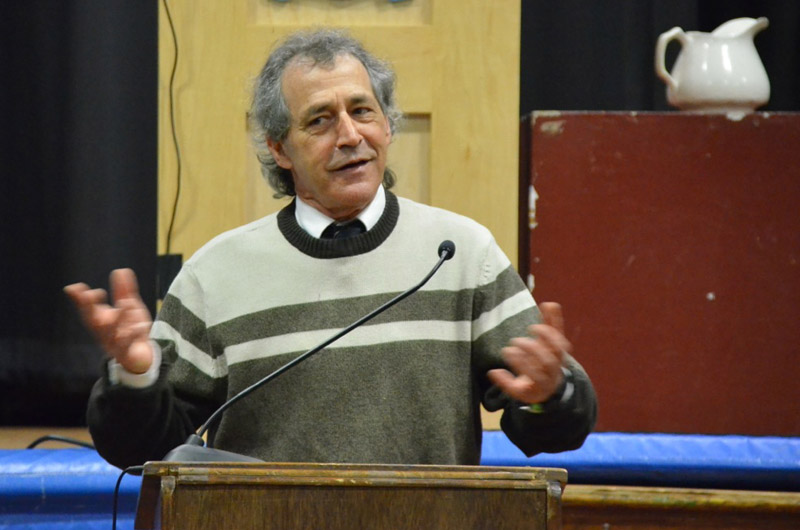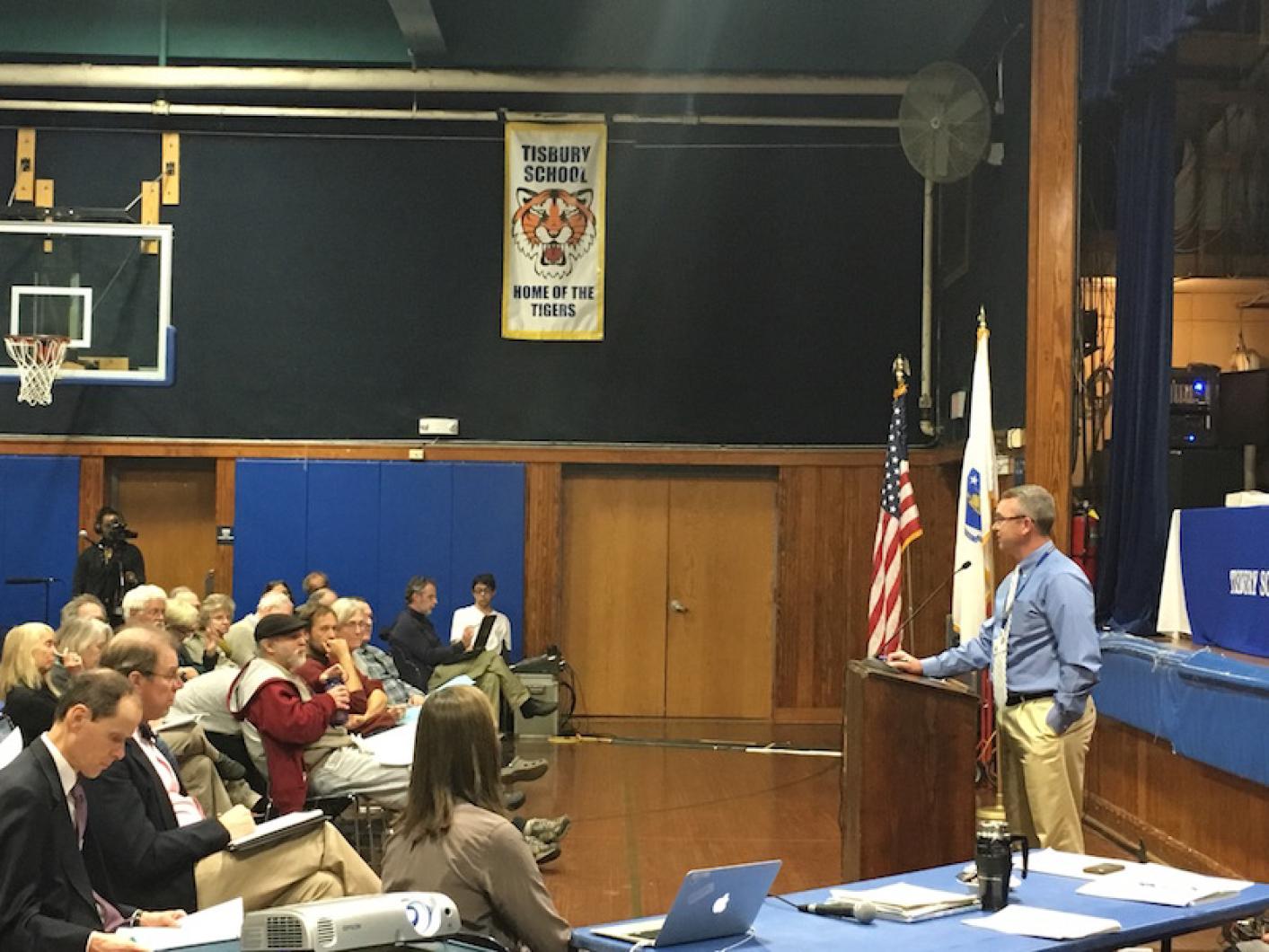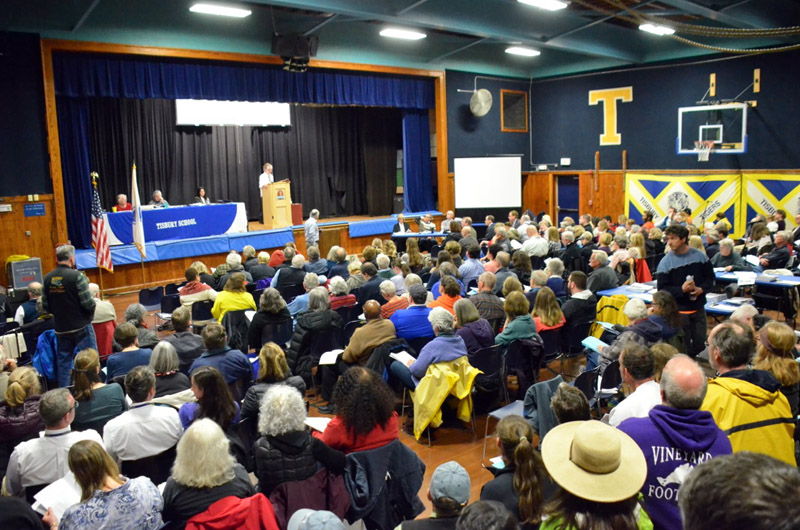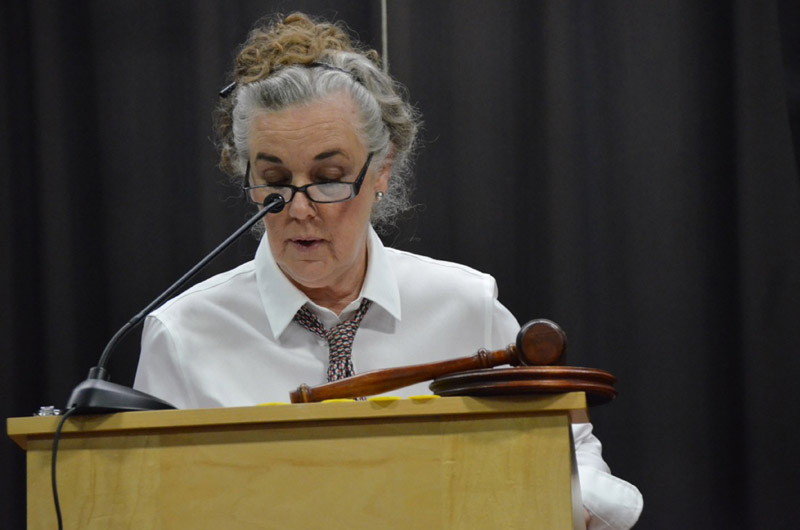A new building project for the Tisbury School got a boost from voters Wednesday night when $825,000 was approved for a feasibility study during the second night of the annual town meeting.
“If I was going to build a million-dollar house and the bank was going to give me $400,000, I’d be an idiot not to take it,” said Rick Brew, a Tisbury parent and Island builder, referring to state grant money available for the school project.
Money for the feasibility study still needs approval in the ballot box on April 26 in order to become reality.
The second night of town meeting was attended by 115 voters, a smaller crowd than on the first night, when nearly 300 voters filled the school gymnasium. Moderator Deborah Medders presided over both sessions.
On Tuesday voters agreed to take the first step toward allowing hard liquor in restaurants and backed an initiative to make the Tashmoo Overlook a public park.
But the majority of spending decisions were left for Wednesday, when among other things a $25.5 million budget was approved. “You should all know we really did our best to reduce this budget,” selectman Larry Gomez told voters.
And there was good news on the financial front, when voters learned that a general override to Proposition 2 1/2 will not be needed this year after all. Three articles were withdrawn — $95,000 for a new pumpout boat, $40,000 for a walkway project on the Lagoon, and $104,000 for renovations to the playing fields at Veterans Park. That money not spent, plus a $775,000 transfer from reserve funds to reduce the tax rate, made moot a $350,000 general override question that will appear on the ballot in two weeks.
Still, the future was on the minds of some voters.
“We have to find a way to restructure ourselves so we are sustainable,” said Rachel Orr. “I would really ask all of us to work very hard this year and our leaders to show some true leadership and do something, because we’re in trouble,” she said, drawing applause.
In other action Wednesday, voters agreed to spend $789,000 from Community Preservation Act funds on 16 projects, including restoring windows at the former Marine Hospital, repairing a section of the town hall roof, replacing the dock stairs at the Martha’s Vineyard Shellfish Group hatchery on Lagoon Pond, and designing an educational sign for the Lagoon Pond drawbridge. A total of $515,000 was approved for a variety of capital improvements and new equipment, including new protective clothing for the fire department, new vehicles for the Department of Public Works and two HVACs at the library.
A request from the harbor department to spend $25,000 on 20 so-called conservation moorings that are less disruptive to eelgrass beds was tabled.

And for the second year, a $300,000 plan to bury utilities along Beach Road failed to muster the two-thirds majority needed for approval. The plan was tabled last year with a request for more information. On Wednesday night, town administrator John (Jay) Grande said that with the Beach Road improvement project about to begin, the project is timely. The state Department of Transportation and power company Eversource will pay a portion of the cost of moving utilities during the project, but they will not pay to put them underground. “This is obviously the time to give it strong consideration and make a decision,” Mr. Grande said.
After discussion, the vote on the article was 98 to 62, falling short of the needed two thirds majority.
On Tuesday night, voters took action on 21 nonspending articles in a special town meeting (all but one passed), and got started on the annual town meeting warrant.
A petitioned request to allow the sale of hard liquor in restaurants saw sharp debate on both sides of an issue that has never seen unanimity in the Island’s main port town. Historically a dry town, six years ago Tisbury voters agreed to allow the sale of beer and wine in restaurants with more than 30 seats. That initiative proved deeply divisive and took two referendum votes to pass. The recent request to expand alcohol sales in qualifying restaurants made it onto the annual town meeting warrant at the eleventh hour. The article voted on this week is a first step, instructing the selectmen to file a home rule petition with the state legislature. Once that is approved, the issue will come back before the town for a second vote.
Mary Kenworth, co-owner of Beach Road restaurant, spoke as a backer of the petition, suggesting the change would help control over-consumption of alcohol, unlike the days of BYOB.
But Peter Goodale took another view, saying the restaurants were creeping closer to bar territory. “You get to the point where you’re serving just a hamburger and they order six or seven drinks and I don’t see the difference between that and a bar,” he said. Nat Benjamin recalled six years ago when the beer and wine question divided the town. “I think we ought to stand firm and keep Vineyard Haven the way it is,” he said.
Public safety officials, including the fire and police chiefs, said they saw no pitfalls in allowing hard liquor sales in restaurants. Fire chief John Schilling said beer and wine licenses are one of the strongest tools the town has to enforce adherence to the fire safety codes in restaurants.
“They don’t want to lose this license once they get it, so they have brought their places into compliance and all of the restaurants are a much safer place and in compliance than they were prior to that happening,” Mr. Schilling said.
Sarah York, a business owner in both Vineyard Haven and Edgartown, said expanding alcohol sales will be a boost to restaurants and in turn to other businesses. She noted that her Vineyard Haven business closes at 6 p.m. while the one in Edgartown stays open until 10 p.m. in the summer.
“Running a business on Main street in Vineyard Haven can be a struggle competing with the other towns,” she said. “We have some great restaurateurs . . . I’d love to give them the leg up on other restaurants in other towns and make this town that people want to stay in the evening.”
“Give it a shot,” quipped Josh Goldstein, whose family owns the Mansion House.
The article was approved 136 to 63.
In other business, voters backed a zoning change that gives more town oversight for commercial construction over 3,000 square feet in the B-2 business district.
The Tashmoo Overlook is on its way to becoming a public park after voters approved an article instructing the selectmen to take steps to designate the area formally as open space.
A bylaw to regulate so-called nontraditional vessels on the water stirred discussion.
“I’m really troubled by the language here,” said Phil Hale. “What is a traditional vessel? The Alabama? Shenandoah?” Selectman Tristan Israel replied: “This is about houseboats and floating workshops. No one is trying to regulate the Shenandoah.” The bylaw was approved.
Voters approved the creation of a fish committee, a new patrolman position in the police department and a facilities manager position. They amended the sewer advisory board from five to seven members to include one rate payer and one at-large member.
But they balked at a planning board article that would allow board members who missed a public hearing to participate after listening to a recording or watching a video of the meeting.
“It’s just giving us a tool so we will not inconvenience applicants,” said planning board chairman Daniel Seidman, speaking in favor of the article. “It’s giving us capacity to do our business and serve applicants as quickly as we can.”
For others, including Mr. Israel the selectman, said the idea didn’t sit well.
“I just like the way we do business, face to face, person to person,” he said. “This to me, is eroding in some subtle way our long tradition of type of government.”
The article was amended to only apply to the planning board, but ultimately failed 96 to 131.
The annual town meeting began with a dedication of the town report to Aase Jones, the longtime assistant to the town administrator who retired early this year.
“There’s no one who’s had the town’s back more than Aase,” Mr. Israel said.








Comments
Comment policy »